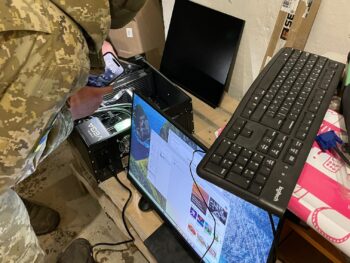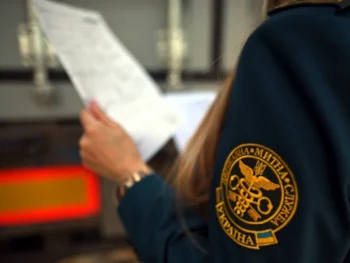As part of its mission to strengthen Ukraine’s border management capabilities, the EU4IBM-Resiliense Project, funded by the European Union, delivered targeted training sessions for customs officers working with Rapiscan Eagle M60 mobile cargo scanners recently deployed at the Krakivets and Yahodyn border crossing points (BCPs).
Between 30 June and 18 July, twenty officers from the State Customs Service (SCS) of Ukraine participated in two intensive training modules – one on system operation and one on image interpretation – designed to equip them with the skills to efficiently operate the scanners and accurately analyze cargo images in real-time.
The Rapiscan Eagle M60 scanner is one of the most advanced mobile cargo inspection systems globally, capable of detecting concealed items through dense cargo using dual-energy transmission and backscatter imaging. However, its effectiveness depends heavily on the people operating it.
Recognising this, the EU4IBM-Resiliense Project ensured that each scanner delivery is followed by specialised, hands-on training tailored to the needs of Ukraine’s customs officers. The training included five days of operator instruction, focused on safely deploying the scanner, navigating its interface, and conducting non-intrusive inspections of cargo vehicles, and two days dedicated to image interpretation, helping officers identify anomalies, recognise concealment techniques, and differentiate between materials such as metals, narcotics, or organic goods based on density and X-ray contrast. A highly experienced trainer representing the scanner producer – Rapiscan Systems -delivered the sessions, combining classroom exercises with real-life scanning practice inside the mobile units.
Participants gained valuable insight into interpreting complex X-ray images, enhancing their decision-making during inspections. According to Artem Mulenko, Deputy Head of the Mobile Scanning Systems Department of Volyn Customs:
“The training content and hands-on format will help our operators use Rapiscan systems more effectively and confidently. The feedback loop between trainer and trainees, throughout the course, contributed significantly to absorbing new, practical knowledge.”
The initiative is part of a broader contract that also supported earlier training at BCP Chop and will later include technical maintenance and system administration training for six SCS specialists. That advanced training will take place at the Rapiscan factory in the United Kingdom, preparing Ukrainian technicians to carry out basic maintenance and system troubleshooting themselves – ultimately reducing downtime and reliance on external support.
“Our goal is not only to provide modern scanning systems but to ensure that Ukrainian customs officers are fully capable of using them independently and effectively,” said Vyacheslav Toporov, EU4IBM-Resiliense Project Manager. “With this training, we help reduce reliance on external support, minimize equipment downtime, and improve decision-making during customs inspections.”
With training for operators of new mobile scanners now delivered at Chop, Krakivets, and Yahodyn, and advanced image interpretation sessions completed across seven Ukrainian BCPs equipped with older stationary Nuctech scanners, the EU4IBM-Resiliense Project continues to pair high-tech solutions with human capacity building, thus ensuring more secure, efficient, and resilient border control operations.











